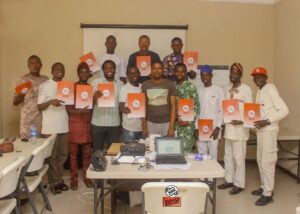Tinubu to give Nigerian youths opportunities to relocate Legally with assured jobs Abroad – Abayomi Odunowo
According to a report by the World Bank, Nigeria received a total of $26 billion in external remittances in 2020. This is a significant amount, and it suggests that there is great potential for Nigeria to increase its remittance inflows from Nigerian citizens living abroad. However, when we look at comparison with India’s remittance inflows, which totaled $110 billion in 2022, it becomes clear that Nigeria has a long way to go in order to maximize the potential of external remittances.
It is interesting to note that the total investment in terms of business to Nigeria is only $5.3 billion yearly. This stark contrast between the investment and remittance figures raises an important question: why do we not focus more energy on increasing the remittances into Nigeria as it looks like a much better option and much easier to achieve than investments?
There are several reasons why increasing external remittances should be a priority for Nigeria. Firstly, remittances are a stable source of income that can contribute significantly to the country’s economy. Unlike foreign direct investments, which are often subject to economic and political uncertainties, remittances are more stable and predictable. This stability can provide a reliable source of foreign exchange for Nigeria, which can help to stabilize the value of the Naira and improve the country’s balance of payments.
Secondly, external remittances have a direct impact on poverty reduction in Nigeria. A significant portion of remittances is used by families to cover essential expenses such as food, housing, and education. This not only reduces poverty at the household level but also has a positive effect on the broader economy. As families have more disposable income, they are able to contribute to local businesses and stimulate economic growth in their communities.
Furthermore, increasing external remittances can help to address Nigeria’s foreign exchange shortage. Nigeria has been facing a foreign exchange shortage in recent years, which has led to a scarcity of dollars and a depreciation of the Naira. By increasing remittances, Nigeria can boost its foreign exchange reserves and reduce the pressure on the Naira. This, in turn, can help to stabilize the economy and create a more favorable environment for investment.
So why then is Nigeria not focusing more energy on increasing external remittances? One reason could be the lack of a coordinated strategy to promote and facilitate remittance inflows. Unlike other countries such as India, which have established dedicated entities to promote and facilitate remittances, Nigeria has not made remittances a priority in its economic development agenda. Without a clear strategy and concerted efforts to reduce the costs and barriers associated with remittance transfers, it is unlikely that Nigeria will be able to unlock the full potential of external remittances.
Another factor that may be hindering the growth of remittances in Nigeria is the lack of financial inclusion. Many Nigerians living abroad may not have access to formal financial services, which can make it difficult for them to transfer money to their families back home. By improving financial inclusion and developing innovative remittance channels, Nigeria can tap into a larger pool of remittance senders and increase the overall volume of remittances.
By increasing external remittances from Nigerian citizens living abroad should be a key priority for Nigeria. Not only can remittances provide a stable source of foreign exchange and contribute to poverty reduction, but they also have the potential to stimulate economic growth and investment. By developing a coordinated strategy to promote and facilitate remittance inflows and improving financial inclusion, Nigeria can unlock the full potential of external remittances and create a more robust and resilient economy.
We have a game changer in our hands that has the potential to turn Nigeria’s remittances to a staggering $100 billion yearly. The key to achieving this lies in preparing a master plan and utilizing the immense pool of highly educated yet jobless youth in the country. Nigeria is blessed with a large number of university graduates every year, but unfortunately, many of them struggle to find employment. However, their skill sets can be tailored to meet the demands of the international market, where there is a strong demand for such talent.
Nigeria is home to some of the brightest and most educated youth in Africa. Every year, thousands of young people graduate from universities across the country, equipped with valuable skills and knowledge. However, the job market in Nigeria is unable to absorb the growing number of graduates, leaving many of them without viable employment opportunities. This not only poses a significant challenge for the youth but also results in a significant loss of potential talent and contribution to the economy.
However, if we were to harness the potential of this highly educated youth, we could unlock an unprecedented opportunity to significantly boost the country’s remittances. By aligning their skill sets with the demands of the international market, we can create opportunities for them to work and earn income from abroad. This will not only provide them with much-needed employment but also contribute to the growth of the Nigerian economy through the inflow of foreign remittances.
To achieve this, however, a comprehensive master plan is essential. The plan should focus on identifying the skill sets that are in demand internationally and equipping the country’s youth with those skills. This could involve implementing specialized training programs, creating partnerships with international organizations, and providing support for young people to seek employment opportunities abroad.
Furthermore, the master plan should also involve creating an enabling environment that encourages and supports the migration of skilled workers. This could include streamlining visa processes, establishing networks with international employers, and providing assistance for the transition and settlement of Nigerian workers in foreign countries. Additionally, the plan should also aim to facilitate the transfer of remittances back to Nigeria by creating favorable exchange rates and reducing transaction costs.
By implementing such a master plan, we can tap into the potential of our highly educated youth and pave the way for a significant increase in remittances. The benefits of this initiative will not only be felt by the young people who will have access to better opportunities but also by the country as a whole. The influx of remittances will provide a much-needed boost to the economy, leading to increased investment, improved infrastructure, and greater financial stability for the country.
Nigeria has a game changer at its disposal that has the potential to turn its remittances into a $100 billion yearly opportunity. By preparing and implementing a master plan that focuses on tapping into the skills and potential of the country’s highly educated youth, we can unlock an unprecedented opportunity for economic growth. This initiative is not only essential for the empowerment of young people but also for the overall development and prosperity of the nation. It is time for Nigeria to seize this opportunity and unleash the full potential of its youth.
The global economy is rapidly evolving, and the demand for skilled labor is at an all-time high. Many developed countries are facing a shortage of competent workers in various fields, and they are turning to other countries to fill the gap. Nigeria, with its large population and abundance of talented individuals, has the potential to supply skilled labor to these countries. In order to take advantage of this opportunity, the Nigerian government needs to set up an agency that focuses on feeding the world with competent youths in collaboration with Nigerians in diaspora. This agency would be responsible for identifying the skill set required in most developed countries and helping Nigerian youths get properly employed in these countries.
One of the key components of this agency’s strategy would be to work closely with Nigerians in diaspora. These individuals have already established themselves in various foreign countries and have a wealth of knowledge and experience that can be invaluable in helping Nigerian youths navigate the process of finding employment abroad. By collaborating with these individuals, the agency can tap into their networks and resources to connect Nigerian youths with job opportunities in their respective countries.
Additionally, the agency would also work with the Nigerian population abroad to provide the necessary settlement support to the newly employed Nigerian youths. This would include assistance with housing, transportation, and other basic needs at a much more reasonable cost. The agency would work to establish large business contracts with Nigerians in diaspora, ensuring that these individuals are able to provide the required support to the newly employed Nigerian youths. This not only benefits the Nigerian youths by providing them with a support system in a foreign country but also allows the Nigerians in diaspora to contribute to the development of their home country.
Furthermore, the agency would also work to ensure that a certain percentage of the emoluments earned by the Nigerian youths working abroad is sent back to Nigeria as savings. This would help to create a sustainable source of income for the country and contribute to its economic development. By encouraging Nigerian youths working abroad to save a portion of their earnings and remit them back to Nigeria, the agency can help to strengthen the country’s financial stability and encourage investment in the local economy.
In addition to the financial benefits, this initiative would also have a significant impact on the skills and knowledge transfer between Nigeria and other countries. By sending competent youths to work in developed countries, Nigeria can benefit from the knowledge and expertise they acquire abroad. Upon their return, these individuals can contribute to the development of their home country by applying their newly acquired skills and expertise to various sectors of the economy, further enhancing the country’s overall capabilities.
The establishment of an agency focusing on feeding the world with competent Nigerian youths in collaboration with Nigerians in diaspora has the potential to bring about significant economic and social benefits for Nigeria. By working with Nigerians in diaspora, the agency can help Nigerian youths find employment opportunities abroad and ensure that they receive the necessary support for settlement. Furthermore, by encouraging savings and knowledge transfer, the agency can contribute to the country’s economic development and enhance its overall capabilities. With the right strategies in place, this initiative has the potential to be a game-changer for Nigeria and its global impact.
Are you a young, ambitious Nigerian looking to spread your wings and explore new opportunities abroad? Look no further, as the President Tinubu federal government and the 36 States Governors in. Nigeria will soon be able to assist you in your quest to legally relocate and find employment in a foreign country. Through a unique program, the government will provide you with a loan to cover the costs of relocating and obtaining a job, with the condition that you pay back the loan over a period of time and continue to send remittances back to Nigeria once the loan is repaid.
This innovative program not only supports Nigerian youths in their desire to explore new horizons, but also aims to stabilize the Naira through increased external remittances. By incentivizing young Nigerians to relocate and find work overseas, the program not only addresses the issue of youth unemployment in the country, but also seeks to boost the Nigerian economy through the influx of remittances from abroad.
The decision to leave one’s home country and relocate abroad is never an easy one. Young Nigerians often face numerous barriers and challenges when attempting to secure employment opportunities in foreign countries. From the high costs associated with relocation to the daunting prospect of finding a job in an unfamiliar environment, the path to international employment can be incredibly daunting. However, with the government’s assistance, these barriers are significantly reduced, allowing more young Nigerians to pursue their dreams of working abroad.
The loan provided by the federal government can cover a wide range of expenses associated with relocation, including travel costs, visa fees, and living expenses until employment is secured. By alleviating these financial burdens, the program aims to empower young Nigerians to take the leap and seek employment opportunities overseas, thereby broadening their horizons and gaining valuable experience in an international context.
Furthermore, the condition of repaying the loan over a period of time and sending remittances back to Nigeria demonstrates the government’s commitment to utilizing this program as a means to stabilize the Naira and strengthen the Nigerian economy. As individuals repay their loans and continue to send remittances back to their home country, the overall external remittance inflow is expected to grow significantly. This financial influx has the potential to strengthen the Naira and provide a much-needed boost to the economy, ultimately benefiting all Nigerians.
Moreover, this program also has the potential to address the issue of youth unemployment in Nigeria. By incentivizing young people to seek employment opportunities abroad, the program offers a viable solution for those struggling to find work within the country. Through international employment, young Nigerians can gain invaluable experience, develop new skills, and contribute to the Nigerian economy through remittances.
In conclusion, the federal government’s program to assist young Nigerians in legally relocating abroad and securing employment with the provision of a loan offers a pathway for the country’s youth to explore new opportunities and contribute to the Nigerian economy. By providing financial assistance to cover the costs of relocation and employment, the program not only empowers young Nigerians to pursue their dreams on an international scale, but also has the potential to stabilize the Naira and address the issue of youth unemployment. This innovative approach reflects the government’s commitment to supporting the aspirations of Nigeria’s young population and fostering a brighter future for the country as a whole.
Otunba Abdulfalil Abayomi Odunowo
National Chairman AATSG
14th February, 2024.
Do you have any information or event for Epinews to publish or cover? Kindly Call us on +2349053535322 or send us message on Whatsapp number +2349053535322 or send us an email here







